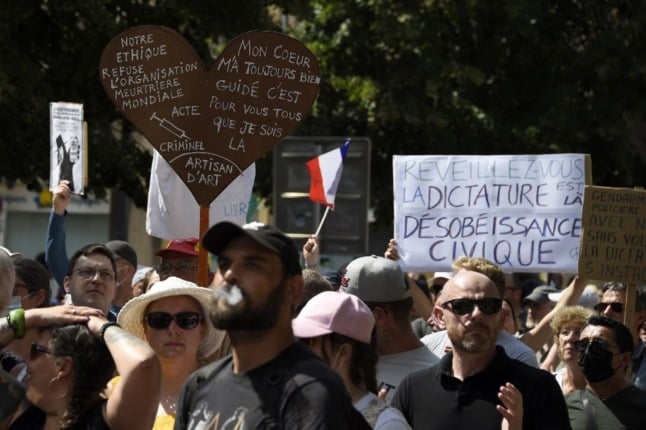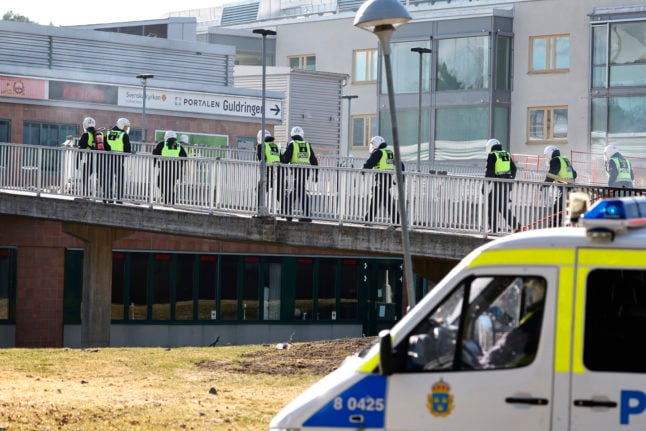Last weekend, nearly 215,000 people took part in anti-health pass marches the length and breadth of the country, according to official figures – down from the 237,000 who had joined protests the previous week.
It was the first drop in participation numbers since the first protests were staged in mid-July.
READ ALSO OPINION: Majority of French have accepted the health passport with little more than a shrug
Four marches are planned in Paris, including two organised by members of the ‘yellow vests’ movement, and one headed by hard-right politician Florian Philippot – who was Marine Le Pen’s number two before leaving her side to form his own political party, Les Patriotes.
The first of the yellow vest protests starts at 11:30am at Place de Fontenoy. The procession, which will leave at 1pm, will head to Bercy.
The second yellow vest-led protest meets at Place de la Bourse from 1.30pm, and will set off in the direction of Place Emond Rostand at 3pm.
Philippot’s protest is at Place Denfert-Rochereau from 2.30pm.
The fourth protest, organised by Paris pour la liberté – a collective formed in March 2020 in protest at the government’s management of the Covid crisis – will meet at Place du Châtelet from 1pm before setting off towards Place Edmond Rostand at 2.30pm.
READ ALSO Health passport wristbands trialled in south west France
Protests elsewhere include those at:
- Agen – 2pm Place Gravier
- Aix-en-Provence – 10am Place Général de Gaulle
- Bayonne – 2pm Mairie
- Bordeaux – 11am Place de la Victoire
- Briançon – 2pm Champ de Mars
- Caen – 2pm Théâtre Caen
- Calais – 2pm Théâtre
- Clermont-Ferrand – 2pm Place De Jaude
- Dax – 10am Place Mairie
- Dieppe – 10am Gare
- Dunkerque – 2pm Place Jean Bart
- Fréjus – 2pm Base Nature François Léotard
- Grenoble – 2.30pm Place Verdun
- Guingamps – 10am Place Vally
- Hendaye – 3pm Place de la République
- La Rochelle – 1pm Parvis de l’Aquarium
- Le Havre – 2pm Hotel de Ville
- Lille – 12pm Place de la République
- Limoges – 2pm Place Jourdan
- Lyon – 2pm Gare des Brotteaux jusque Place Macé
- Marseille – 2pm Vieux-Port
- Metz – 2pm Place de la République
- Montpellier – 2pm Comédie
- Nancy – 2pm Place Maginot
- Nice – 2pm Garibaldi
- Nîmes – 5pm Préfecture
- Orléans – 2.30pm Place République
- Pau – 10am Place Verdun
- Perpignan – 2pm Place Catalogne
- Quimper – 2pm Croix des Gardiens
- Rennes – 2pm – Place République
- Rouen – 2pm Place de l’Hôtel de Ville
- Saint-Jean-de-Luz – 3pm Place Louis XIV
- Strasbourg – 1pm Place Kléber
- Tarbes – 2pm Place Verdun
- Toulouse – 2pm Métro Jean Jaurès
- Vannes – 2pm Esplanade du Port
- Versailles – 12pm Place d’Armes
On August 19th, the Health Ministry reported some 4.7million people in France have had their first dose of Covid-19 vaccine this month alone. By that date, more than 40.5 million French residents were fully vaccinated, while 47.1 million have had at least one shot.
#Vaccination #COVID19 | Au 19 août :
✔ 47 127 195 personnes ont reçu une 1ère injection
✔ 40 508 406 personnes ont un schéma vaccinal complet— Ministère des Solidarités et de la Santé (@Sante_Gouv) August 19, 2021



 Please whitelist us to continue reading.
Please whitelist us to continue reading.
Member comments